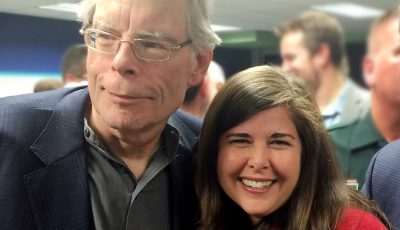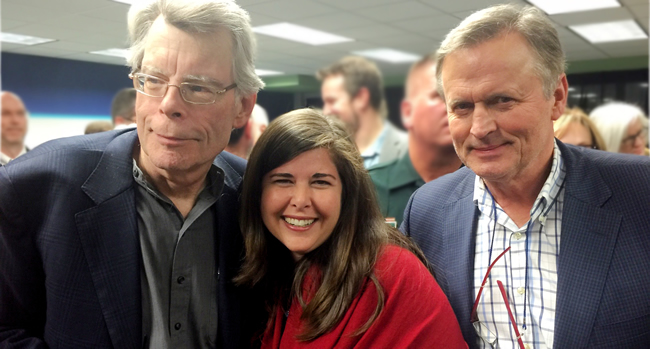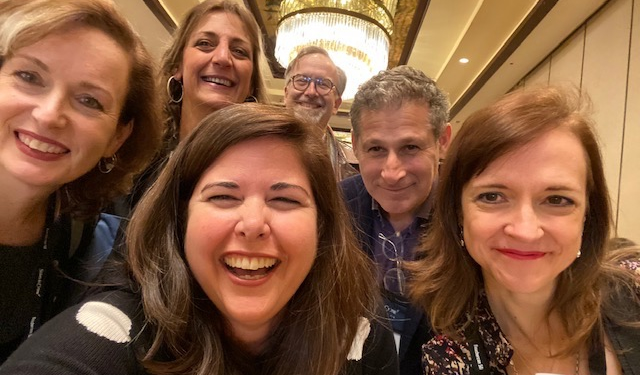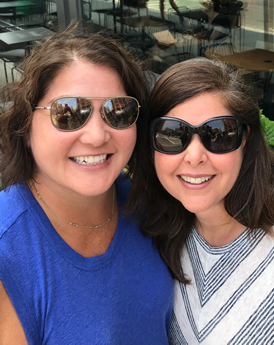

On the Cover: Lisa Unger
Shared Secrets and Sinister Acts
 By K. L. Romo
By K. L. Romo
Could one confession to a stranger change your life forever? What if it was orchestrated? That’s the premise in bestselling author Lisa Unger’s newest thriller, CONFESSIONS ON THE 7:45.
Stay-at-home mom Selena Murphy has the perfect life. Or at least that’s what one would surmise from her Instagram and Facebook accounts. With a successful husband and two wonderful boys, she has it all. But when her husband Graham loses his job, and she returns to work, things change.
One night after working late, Selena takes a seat next to a stranger with whom she experiences an “instant intimacy.” The woman who calls herself Martha asks, “Did you ever do something you really regretted?” And for a reason she doesn’t understand, Selena confides in Martha—she thinks Graham is having an affair with their nanny, Geneva. In turn, Martha confides that she’s having an affair with her boss, which she admits was a mistake.
Selena gets an eerie feeling when Martha asks her, “Wouldn’t it be nice if your problems just went away?” This question continues to creep into Selena’s brain, echoing her fear that something isn’t right.
When Geneva disappears the next day, Selena can’t help but wonder if Martha’s words were more than just casual conversation. Then when Martha sends her a text, Selena knows something nefarious is in play. Who is the woman from the train, and what does she want?
When the police investigate the disappearance and Graham is a suspect, Selena knows she must track Martha down to ask about her cryptic statement. Her marriage and her life depend on the answer. But what she discovers about the woman and her motives fractures her life. Like a mirror broken into a thousand tiny shards, Selena’s perception of the world she thought she knew shatters.
In this twisty-turny thriller, readers will wonder what is real and what is make-believe as they try to determine who are the pawns in a wicked game of true confessions.
In this exclusive interview, Unger talks with The Big Thrill about the blurred lines between heroine and villain, the effects of trauma, and the art of the con.
What is “the germ” that inspired CONFESSIONS ON THE 7:45?
It’s true! There’s always something. A germ, a little spark. Here it was a phrase I heard (and I can’t even remember where): You can’t con an honest man. It stuck with me, and I did some research about common scams and con artists. Later, at a conference, I bounced the idea around with a couple of thriller writer pals. One author—Megan Abbott—said, “I don’t know. That sounds like victim-blaming to me,” which made sense.
Still, I couldn’t let the idea go, and I arrived at a different conclusion: You can’t con someone who doesn’t want something. And everybody wants something. A good swindler makes everyone vulnerable. Soon after, I heard the voices that would draw me through CONFESSIONS ON THE 7:45.

Unger attends a VIP reception with Stephen King and John Grisham at a 2016 fundraiser event hosted by State College of Florida.
Tell us about your research into the psychology of lying, especially scammers.
The topic of lying, con artists, and scams has long fascinated me. Probably the first book I read on lying, and lie detecting, was What Everybody Is Saying by Joe Navarro. His perspective of an FBI interrogator intrigued me—how he described the limbic responses of the brain which create uncontrollable and very subtle tells.
When I first started diving into the subject of scams and con artists, I read several articles and listened to some TED talks—this is how I discovered The Confidence Game by Maria Konnikova. There are so many smart little gems of knowledge in this book. But what especially captured my attention was that many people think they are too smart to be scammed—it’s those people who are most vulnerable.
Liespotting by Pamela Meyer was another enormous influence and a great source of information on how and why people lie. The author claims that we all do it, all the time! We lie not always to deceive or hurt—often we lie to protect, to hide our vulnerabilities, to make ourselves feel better.
But it wasn’t just the swindler or the liar that interested me; it was the victim. Why do so many people, even smart people who should know better, fall for the same ageless scams over and over? How can spouses hide entire “other selves” from the person who should know him or her best? What is the relationship between the liar, the con artist, and her mark? CONFESSIONS ON THE 7:45 results from all those questions—though you might not find easy answers.
How do the issues of trauma and self-esteem wind their way through the novel?
These are big themes in most of my work. How does early childhood trauma impact the life that follows? How, when we are in a dark place inside, can we become complicit in the bad things that happen to us? Life is all about choices, both the big ones and the little ones. This sounds simple, but it isn’t.
The child of abuse might “choose” an abusive spouse because on some subconscious level, she believes that pain is love. An addict might “choose” to steal from her mother because the disease of dependency hijacked her brain. The man who thinks he is unworthy may be subconsciously attracted to a woman who he knows will cheat on him, or withhold her affection. These are the layers of character I like to explore in my novels, and CONFESSIONS ON THE 7:45 is a deep dive into some of these questions.
How did you blur the lines between heroine and villain in CONFESSIONS ON THE 7:45?
The lines between hero and villain are always blurred. All people are a blend of light and dark. Some people make good choices most of the time. In fiction, we might call those people heroes. Some people make bad ones; we might see those people as villains. Some act from love and compassion, while others act from fear and pain.
In life, we don’t find many master criminals, evil geniuses bent on world domination, or motivated by mass destruction. In life, we find real people broken by the circumstances into which they were born, people who are often victims of violence or neglect, people who are uneducated, perhaps never even taught how to live well.
Some people are genetically predisposed to mental illness. Others are addicts, acting from that chaotic inner place. I think the key to creating authentic characters, whether heroes or villains, is empathy and taking the time to look at all the layers so that a rich, textured, and true portrait emerges.

Unger catches up with Icelandic crime writer Yrsa Sigurðardóttir, Lee Child, and Sara Blaedel at ThrillerFest 2017 in New York.
Tell us more about your author interview show on YouTube—Three Good Things—and your #Authortalks chats on Twitter.
I’m having so much fun with these. Surprisingly, I’m an extreme introvert. But the pandemic has taught me that maybe I’m not as introverted as I thought. I miss my friends and the connections I make with other authors when I’m on the road. Meanwhile, it’s my natural instinct to neutralize negativity, so I wanted to bring some happy, positive things to my friends and readers during this difficult time.
That’s why I started connecting via Zoom with my writer pals, asking them to chat with me about a favorite book, show or film, and comfort food or recipe—Three Good Things! The result has been wacky, super fun, smart, informative, and full of great recommendations on all the things we’re doing most right now—reading, eating, and binge-watching!
#Authortalks is something I started doing with authors Mary Kubica, Heather Gudenkauf, and J. T. Ellison. Each week we broach a topic, or pick up a thread from someone else’s conversation, and talk about all things writing. We discuss everything craft and publishing related—from responding to critics, to plotting, to our favorite villains and much more. We try to loop in our writer pals and get the conversation going among lots of different folks. It’s just a great way to talk about the craft and the industry, connect with each other, and include lots of people in a conversation—just like we would do at a conference. So, authors, if you see #authortalks on one of my posts, chime in and share.

Unger snaps a selfie with Alison Gaylin, Wendy Corsi Staub, literary agent Dan Conaway, Chris Pavone, and Megan Abbott at Bouchercon 2019 in Dallas.
Do you have advice for other writers, especially those trying to create psychological suspense?
My only advice to writers of any type of fiction is to remember that no matter where you are in your career—from aspiring to bestselling—it never stops being about the writing. Lately, we’ve been sold an idea that we all need to be out there promoting ourselves all the time—there are more opportunities than ever to do that online. But no one will ever come to your work and stay because you’re a great self-promoter. They will come and stay because you’re a talented writer, because you’ve given your readers a story and characters that move, entertain, inspire, and transport.
Sit down at your keyboard intending to get better every day (I still do!) and devote the vast majority of your energy to writing the best book you can write, every time. You can do your due diligence on the marketing and promotion side, but never lose sight of what’s important—the page.
Tell us something about yourself your fans might not already know.
My readers probably know everything about me! From the books—the entirety of me can be found there. I’m often available in real time on social media. And these days, I’m hanging out in my office and watching my labradoodle Jak Jak nap while I do all my online appearances. So there aren’t many secrets left.
But maybe they don’t know that I have a mindfulness and meditation practice that keeps me sane in a totally insane world, and that I’m a devoted yogini. Namaste!
- The Big Thrill Recommends: WHAT YOU LEAVE BEHIND by Wanda M. Morris - June 27, 2024
- Sally Hepworth - May 10, 2024
- Katherine Ramsland - April 25, 2024


